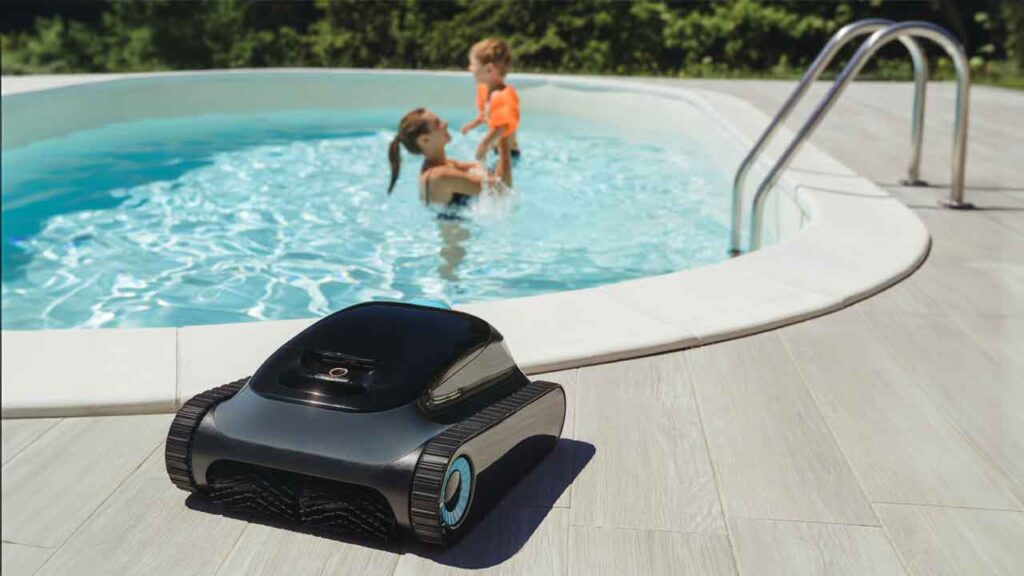
Keeping your pool sparkling clean shouldn’t equal astronomical energy costs. That’s where an energy-efficient pool cleaner comes in. Engineered to minimize power use while providing potent cleaning, these intelligent devices are ideal for environment-friendly homeowners who also desire convenience. But what exactly constitutes an energy-efficient pool cleaner? Let’s discuss the key features that distinguish eco-friendly models from their conventional counterparts.
Smart Navigation That Saves Energy
One of the most impressive aspects of contemporary pool cleaners is that they “think.” Rather than randomly moving like older units, energy-efficient pool cleaners employ intelligent navigation systems. These typically involve sensors, gyroscopic mapping, or mapped routes. The payoff? Cleaner pools in less time. By eliminating overlap and targeting high-traffic areas, your pool is cleaned more quickly—and cost-effectively.
Low-Voltage Motors for High Impact, Low Cost
The core of any energy-efficient design is a low-voltage motor. They usually operate on 24 volts or lower, as opposed to the much higher wattage of conventional pool pumps. They use less energy but are designed to provide high suction power, efficient water circulation, and aggressive scrubbing ability.
Optimised Water Flow and Internal Design
One of the biggest energy savers is the internal design of the pool cleaner. High-end models reduce water flow through slim but smooth passages that reduce drag. This enables water to travel faster through the unit without the need for increased power. Impeller designs and intake systems are also designed to pick up debris effectively without stressing the motor.
Programmable Cleaning Cycles for Targeted Use
Another characteristic feature of an energy-efficient pool cleaner is that it can schedule personalized cleaning cycles. Whether you need a 30-minute spot clean or a complete two-hour sweep, these machines can accommodate. This prevents unnecessary running and allows the cleaner to run only when necessary, minimizing overall energy usage. Some models even have remote or app-based control so you can adjust settings remotely.
Cordless and Battery-Powered Convenience
Cordless robot pool cleaners are increasing in popularity, and it is easy to understand why. Unencumbered by the limitations of cables and external power sources, many models depend on lithium-ion batteries with high capacities. With one full charge, they clean an average-sized pool from top to bottom. By eliminating energy waste due to lengthy cords and booster pumps, battery-operated models set the bar even higher for energy conservation.
Lightweight Constructs for Reduced Transport Difficulty
Weight is important in water. The more lightweight the pool cleaner, the less power the motor must expend to drive it. Most energy-efficient designs have short, aerodynamic bodies that slip easily across floors, walls, and even along waterlines. These are streamlined shapes that create less drag and can cover more ground with less energy in less time.
Multi-Layered Filtration Systems
The best energy-efficient pool cleaners do not rely on raw suction alone. Instead, they use advanced multi-layered filters. These systems separate large debris from fine particles using smart engineering. Efficient filtration reduces the strain on the internal components and allows the unit to clean more in a single pass, saving both time and electricity.
Eco-Certifications That Guarantee Efficiency
Not all energy-saving claims are created equal. Trusted certifications like ENERGY STAR or NSF ratings offer peace of mind by verifying that the cleaner meets strict energy efficiency standards. When shopping for your next pool cleaner, look for models that are independently tested and rated for their eco-friendliness and performance.
Durable Build for Long-Term Efficiency
Reliability is crucial in determining the effectiveness of a pool cleaner in preserving its energy-saving features over time. High-end models consist of impact-resistant plastic, stainless steel, and UV-stable materials. Not only do these components increase the durability of the product, but they also minimize performance loss, which can lead to more energy being consumed in the long run.
User-Friendly Maintenance Reduces Waste
A maintenance-friendly unit is more likely to remain energy-efficient. The majority of current cleaners come equipped with easy-access filter trays, modular components, and clog-proof features. What this offers is easy cleaning or replacement of parts so the unit can always operate at optimal performance. Less resistance means less energy consumption.
Perfect for a broad variety of pools
Energy-efficient designs are not reserved for small in-ground backyard pools. Most of the newer designs can accommodate large in-ground residential pools, lap pools, and even shallow lounging pools. Their capacity to chart and adapt to various configurations guarantees that they will clean well irrespective of pool size, saving time and electricity once more.
Smart Technology for Smarter Cleaning
With the rise of home automation, some energy-efficient pool cleaners now come with Wi-Fi or Bluetooth connectivity. These smart features allow for real-time monitoring, fault detection, and even predictive maintenance alerts. By identifying problems early, the unit avoids overexertion and maintains a lower energy footprint.
Price Versus Long-Term Savings
Though energy-efficient models cost more initially, they provide long-term value in the form of lower electricity bills and less maintenance. You also save on not requiring booster pumps or other plumbing modifications. The cleaner essentially pays for itself in the long run through daily energy savings.
Environmental Impact That Matters
Wising up and upgrading to an energy-efficient pool cleaner not only costs you less in the long run, but lowers the environmental load of your house as well. Less electricity use equates to a lower carbon footprint. Furthermore, most cleaners are constructed out of recyclable components and pack down into streamlined, earth-conscious packaging. This is a compact but effective solution for homeowners with eco-friendly tendencies.
Final Thoughts
Choosing the right pool cleaner isn’t just about performance—it’s about efficiency, cost savings, and reducing your environmental impact. From smart navigation and battery-powered operation to low-voltage motors and programmable cycles, an energy-efficient pool cleaner combines innovation with responsibility.
If you’re planning to upgrade your current setup, consider investing in a model that prioritises both power and preservation. It’s a smarter way to swim—and to save.